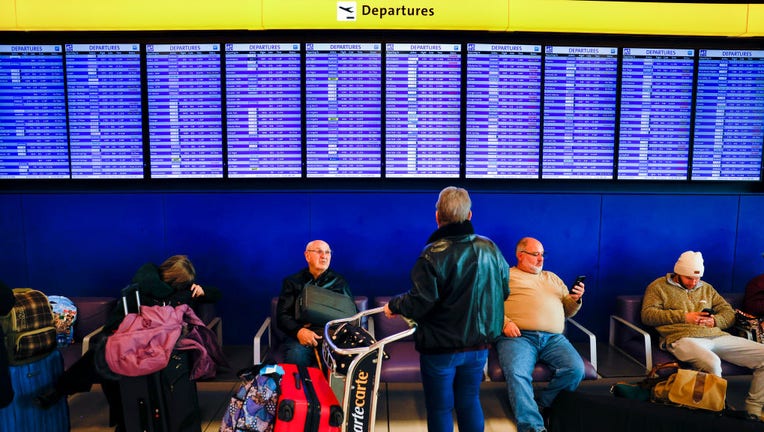Airlines - not weather - blamed for rising flight cancellations, new report finds

Travelers look at a departures board at Denver International Airport showing canceled and delayed flights. (Photo by Michael Ciaglo/Getty Images)
Congressional investigators said in a report Friday that an increase in flight cancellations as travel recovered from the pandemic was due mostly to factors that airlines controlled, including cancellations for maintenance issues or lack of a crew.
The Government Accountability Office also said airlines are taking longer to recover from disruptions such as storms. Surges in cancellations in late 2021 and early 2022 lasted longer than they did before the pandemic, the GAO said.
Much of the increase in airline-caused cancellations has occurred at budget airlines, but the largest carriers have also made more unforced errors, according to government data.
Airlines have clashed with Transportation Secretary Pete Buttigieg over blame for high rates of canceled and delayed flights in the past two years. Airlines argue that the government is at fault for not having enough air traffic controllers, while Buttigieg has blamed the carriers.
The GAO report was requested by Republican leaders of the House Transportation Committee. The GAO said it examined flight data from January 2018 through April 2022 to understand why travelers suffered more delays and cancellations as travel began to recover from the pandemic.
The GAO said weather was the leading cause of cancellations in the two years before the pandemic, but the percentage of airline-caused cancellations began increasing in early 2021. From October through December 2021, airlines caused 60% or more of cancellations — higher that at any time in 2018 or 2019.
At the time, airlines were understaffed. The airlines took $54 billion in taxpayer money to keep employees on the job through the pandemic, but they reduced workers anyway by paying them incentives to quit.
RELATED: Is turbulence happening more often?
As travel rebounded, the airlines struggled to replace thousands of departed workers. They now have more workers than in 2019 — and the cancellation rate this year is lower than during the same period in 2019, according to data from tracking service FlightAware.
A spokeswoman for trade group Airlines for America said the majority of cancellations this year have been caused by severe weather and air traffic control outages – about 1,300 flights were canceled in one day because of an outage in a Federal Aviation Administration safety-alerting system.
"Carriers have taken responsibility for challenges within their control and continue working diligently to improve operational reliability as demand for air travel rapidly returns," said the spokeswoman, Hannah Walden. "This includes launching aggressive, successful hiring campaigns for positions across the industry and reducing schedules in response to the FAA’s staffing shortages."
Several airlines agreed to reduce schedules in New York this summer at the request of the FAA, which has a severe shortage of controllers at a key facility on Long Island.
In 2019, Hawaiian Airlines and Alaska Airlines had the highest percentages of their own cancellations being caused by an airline-controlled issue — more than half of each carrier's cancellations. In late 2021, they were joined by low-fare carriers Allegiant Air, Spirit Airlines, JetBlue Airways and Frontier, each of whom were responsible for 60% or more of their own total cancellations, according to GAO.
The percentage of cancellations caused by the airline also increased at Southwest, Delta, American and United. The figures did not include the 16,700 late-December cancellations at Southwest that followed the breakdown of the airline's crew-rescheduling system.
The GAO said the Transportation Department has increased its oversight of airline-scheduling practices. The Transportation and Justice departments are investigating whether Southwest scheduled more flights than it could handle before last December's meltdown.
The Southwest debacle has led to calls to strengthen passenger-compensation rules.

